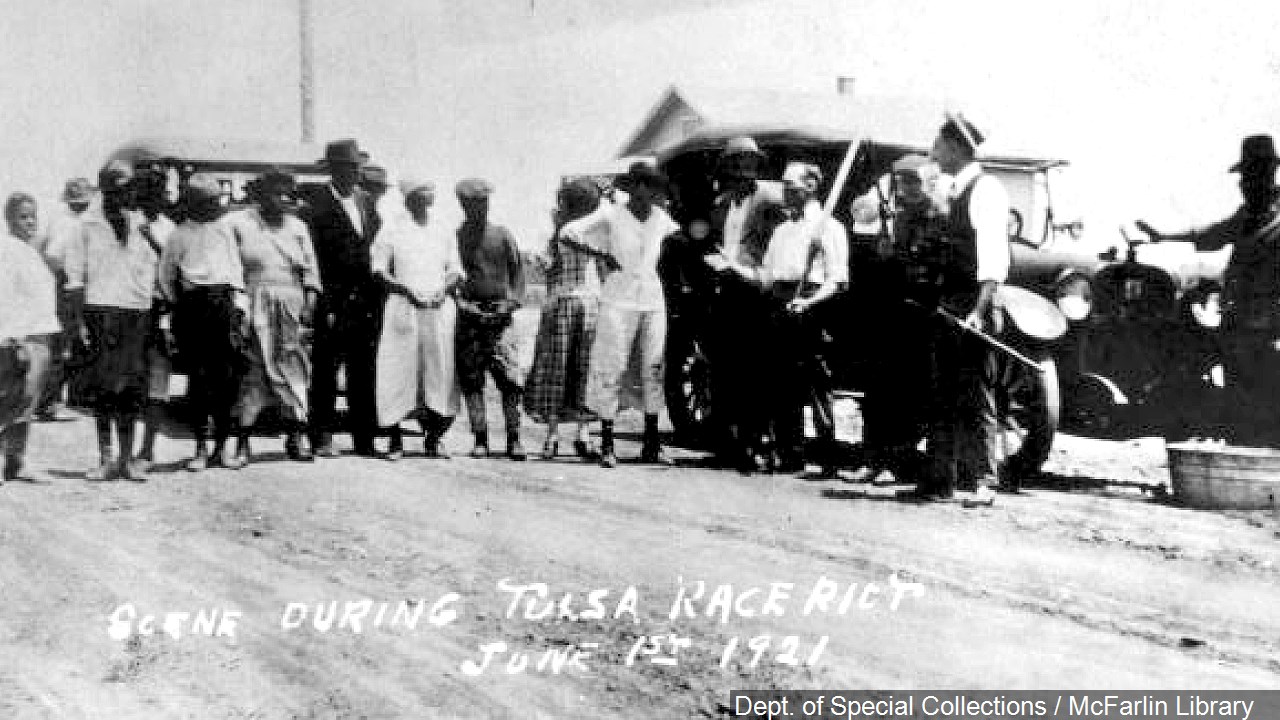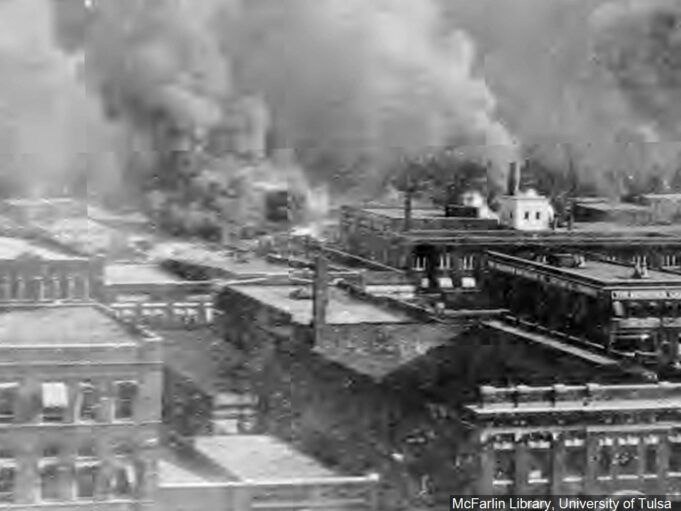It is May 31, 1921. Seven-year-old Viola Ford Fletcher is asleep in her family’s home in the Greenwood district of Tulsa, Okla. Her home is located in a nice neighborhood. She has great neighbors, friends to play with and she feels safe. But all of that is snatched away within hours when a White mob descends, attacks Black residents and burns down businesses.
This is the story of the Tulsa Race Massacre that occurred 100 years ago. In honor of the lives exterminated, the destruction of Greenwood—Black Wall Street—and the continued injustice of Black residents, a congressional hearing was held on May 19.
“The night of the massacre, I was awakened by my family. My parents and five siblings were there. I was told we had to leave and that was it. I will never forget the violence of the White mob when we left our home,” recalled Mother Viola Fletcher, 107 years old, the oldest living survivor of the Tulsa Race Massacre.
“I still see Black men being shot, Black bodies lying in the street. I still smell smoke and sulfur. I still see Black businesses being burned. I still hear airplanes flying overhead. I hear the screams. I have lived through the massacre every day. Our country may forget this history, but I cannot, I will not, and other survivors do not. And our descendants do not,” she said at the hearing.
At 107 years old, she has never seen justice. “I pray that one day I will. I have been blessed with a long life and have seen the best and the worst of this country. I think about the terror horribly inflicted upon Black people in this country every day,” she said.
“This subcommittee has the power to lead us down a better path. I’m asking that my country acknowledge what has happened to me. The traumas and the pain, the loss and I ask survivors and descendants to be given the chance to seek justice.”
Mother Fletcher’s 100-year-old brother, Hughes Van Ellis, a World War II Veteran, and massacre survivor Mother Lessie Benningfield Randle, 106 years old, also testified. The three survivors have an ongoing lawsuit seeking reparations.

Congressman Steve Cohen (D-Tenn.) presided over the hearing. He said it served two primary purposes: one, to commemorate the anniversary and to educate the public about what happened; and two, to “highlight the many ways that the Black community of Tulsa continues to suffer from the effects of the massacre.”
“Having the opportunity to hear from actual survivors of the 1921 Tulsa Race Massacre gives us insight into the nation’s most horrific massacre that took place in Tulsa, Oklahoma in the Bible Belt of America. And it’s an incident where thousands of Whites descended on the African American community and killed hundreds of innocent African Americans,” said Michelle Brown-Burdex, program coordinator for the Greenwood Cultural Center, to The Final Call.
Historians estimate that as many as 300 people died. Ms. Brown-Burdex said the history continues to unfold, as the city of Tulsa leads a mass graves investigation, looking to identify where some of the victims of the massacre are buried.
She said in some ways, the city is still segregated, and a lot of work has to be done to create a community that has access to necessities, resources and services. “And something that we need to discuss as well is historical trauma; trauma that has been passed down from these survivors to their descendants and how that trauma should be addressed,” she said.
Dr. Greg Carr, chair of the Africana Studies Department at Howard University, described America as a criminal enterprise that was built by dispossessing Native Americans of their land and enslaving Black people. “The fact there was a Greenwood district is the result of the forced relocation of Black folk stretching back as early as the second and third Seminole wars, driving them out of Florida with the Creek and the Seminoles, the Black Seminoles,” he said to The Final Call.
He said the Tulsa Race Massacre hearing shows that White supremacy is on its deathbed and is fighting to survive and that Black people’s demands for reparations puts America on trial.
“A reparations demand isn’t based on what you think you can get. A reparations demand is based on what you are owed,” he said. He lifted words from the Honorable Minister Louis Farrakhan of the Nation of Islam, echoing Dr. Martin Luther King Jr., on redistributing the pain.
“We have to fight on that front, and Black Wall Street shows us what happens when we organize. White people decide, ‘Oh, y’all are doing well, so let’s destroy it.’ And when they come to destroy it this time, we need to take full advantage of the Second Amendment and invite them on down. We can just go and maybe have to settle this in the street, because one thing about what White nationalists are, they’re cowards,” he said.
“So they’re not going to come and do what they did in 1921. Not in 2021, because the more we know about what happens every time, the more we’d be prepared for that never to happen again. And so next steps require us educating our children, educating our communities, so that we can come up with solutions, including self-defense that will protect us,” added Dr. Carr.
Ms. Brown-Burdex, who has an LLC where she serves as a historic storyteller, advised the average, everyday person who wants to get involved in the fight for reparations to educate themselves about the history of Tulsa and then to align themselves with individuals and organizations that are identifying the descendants of the massacre.
“Align themselves with organizations that are working to demand reparations. Align themselves with organizations that are telling our history, such as the Greenwood Cultural Center. And remain active; remain vocal. Sign the petitions. Join in the protests and in the rallies and in the marches that are taking place,” she said. She also encouraged people to join the commemoration of the 1921 Tulsa Race Massacre with the Greenwood community.
She expressed that it’s important to make sure that Black voices are heard. “This is a unified effort to seek reparations and justice,” she said. For more information, visit greenwoodculturalcenter.com.













